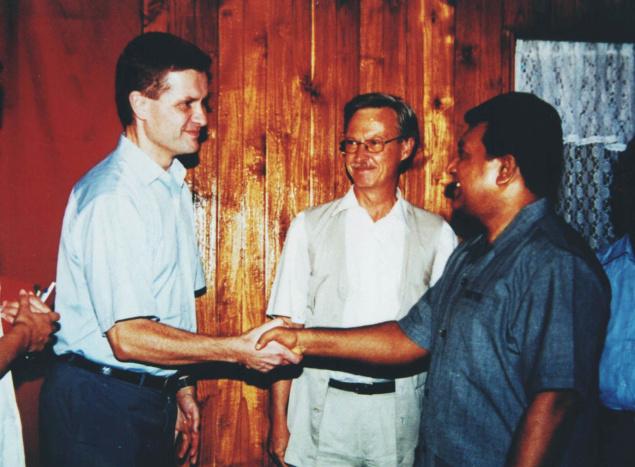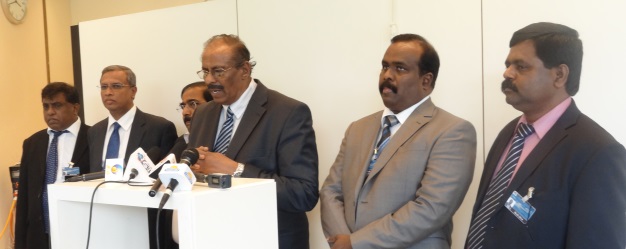[TNA at UNHRC March 2014 : The most difficult challenge for Sri Lankan President Maithripala Sirisena will be reconciliation with the Tamils]
Anyone who two months back bet on Maithripala Sirisena winning the presidential election in Sri Lanka would be a millionaire. Most international experts expected former President Mahinda Rajapaksa to win and strengthen his family rule. He controlled the resources of the state to fund his election campaign and administered thousands of buses to transport people to election rallies. The state-controlled media broadcast Pravda-style propaganda and outright lies about high-profile defections from the opposition, even on election day. Fake pamphlets called on Tamils to boycott the elections. The economy was good and Mr. Rajapaksa, who so brutally ended the long war with the Tamil Tigers, was still popular with the Sinhalese majority. But more and more voices from Sri Lanka itself whispered to me — please wait and see, the opposition may still win.

Victory for Sri Lanka
The victory for Mr. Sirisena was a huge victory for Sri Lanka. Mr. Sirisena led one of the broadest coalitions in politics seen anywhere at any time. It included the left wing party Janatha Vimukthi Peramuna (JVP) and the right wing United National Party (UNP) party. It was supported by Tamils and Muslims as well as the hard-core Buddhist nationalist of the Jathika Hela Urumaya (JHU) party. The two historical leaders Chandrika Kumaratunga and Ranil Wickramasinghe joined hands with cricket stars and general Sarath Fonseka, who led the war against the Tamil Tigers.
The victory could also not have happened if not for the brave people in public service. There was limited violence because army and police chiefs at the end stood up to support democracy. The head of the elections commission personally marched over to the state television channel and threatened to shut it down unless it retracted and stopped spreading lies. Votes were counted as they were cast. Sri Lanka may move towards an Indian federal style of independent bureaucracy with integrity.
President Sirisena is unknown at the highest level of politics. But he has important qualities: he is widely seen as honest and hardworking, was an effective Health Minister, and a party loyalist in the Sri Lanka Freedom Party (SLFP). He has appointed Mr. Wickramasinghe, an experienced and visionary politician, as Prime Minister. Mr. Sirisena originates from the Sinhala heartland of Polonnaruwa and has first-rate credentials as a devote Buddhist with rural roots. This is important as it may be easier for a leader deeply rooted among the Sinhalese to make true concessions to the Tamils.
The election victory was possible due to massive support from all Sri Lankan minorities. Mr. Rajapaksa won 90 out of 160 electoral districts and came out on top in nearly all Sinhala-dominated provinces. Mr. Rajapaksa roughly won the Sinhalese vote by 55 per cent. This was compensated for by Mr. Sirisena winning around 80 per cent of the Tamil vote and an even bigger share of Muslim votes. For this was payback time. Mr. Rajapaksa had either instigated atrocities against Muslims last year or, at the very minimum, failed to protect them. The election was also a major setback for those in the Tamil diaspora who called for an election boycott. Tamils decided with their feet — they went to polling stations in high numbers and nearly all of them preferred the “unknown angel” Mr. Sirisena to the “known devil” Mr. Rajapaksa, as the latter himself put it during the election.
Bumpy way forward
Can Mr. Sirisena and Mr. Wickramasinghe deliver? The way forward will be bumpy. The immediate issue is working with the present Parliament. The President has set a 100-day deadline for putting in place democratic reforms. A parliamentary election will be called if the present Parliament with many Rajapaksa supporters proves unworkable. That will pull Sri Lanka into a new election frenzy and widen conflict.
This is a once-in-a-generation opportunity to create lasting peace and democracy in Sri Lanka and set the country on a path to inclusive growth. The coalition includes communists and liberals with widely different views on economic and social policies. This rainbow coalition differs when it comes to reconciliation and the Tamil issue. There are three main dishes on its plate. In order of complexity they are: restoring democracy, launching inclusive growth and resolving the Tamil national question.
The restoration of democracy is where it is likely to have most immediate success. The election showed how deeply rooted democracy is in Sri Lanka. Reforms will strengthen this democracy by making the courts, the central bank, the army and police more independent from politicians of the day. Those people who became ambassadors and judges purely out of their loyalty to Mr. Rajapaksa will be replaced with more competent people. Media censorship will be lifted and journalists will be free to challenge authority and expose corruption. Houses of torture will be closed. The independent personal security apparatus of Mr. Rajapaksa’s brother Gotabhaya will be dismantled. Journalists and activists, most often Tamils, will not disappear in the night, no more to be seen.
Sri Lanka is one of the richest countries in South Asia and has huge potential for more investments in tourism, fisheries, shipping and the IT industry. The economy is growing at a good 7-8 per cent and the population is well-educated and hard-working. The big challenge will be inclusive economic growth that benefits all ethnic groups. India and western nations should rapidly match the useful Chinese investments in the land. Tourists should be encouraged to pour into the Thailand of South Asia. The government should reach out to the Tamil diaspora, probably the most economically successful diaspora on the planet. They are doctors, entrepreneurs and stock brokers and can provide investments and expertise.
The most difficult challenge for the new government will be reconciliation with the Tamils and with the Muslims. But President Sirisena can start a process that will create lasting peace and will solve the issue that has preoccupied Sri Lanka for the entire lives of today’s people. A lot can be done right away — language rights of the Tamils can be restored and the army can be removed from some of the lands it occupies in the north. Political talks with the Tamil National Alliance, the elected representatives of Tamils, can start.
Investigations of the most outrageous crimes and human rights abuses such as the murder of newspaper editor Lasantha Wickrematunge or parliamentarian Joseph Pararajasingham can start. The international community will and should continue to pressure for accountability for the unspeakable atrocities during the war: brutal murders, rapes and killing of innocent civilians. The global human rights community and the Tamil diaspora will keep these issues alive. But the global powers must give the new government some space. It cannot be expected to move on accountability issues without being able to bring Sinhala opinion along. Based on experiences from places like Chile or Serbia, accountability unfortunately takes time. But in the end it comes.
Domestic troubles will dominate the new Sri Lankan agenda. But we will also see a new foreign policy. Delhi will again be the central foreign capital. Mr. Sirisena will for sure continue the hugely beneficial relationship with China and encourage continued investments in energy and infrastructure. But China will no longer be the only friend of Sri Lanka. Mr. Sirisena will go to India for his first state visit, invited by Prime Minister Narendra Modi. Unlike Mr. Rajapaksa, who was not invited by anyone, we will see Mr. Sirisena or Mr. Wickramasinghe in the White House and in European capitals fairly soon. In the end Sri Lankans voted for the “unknown angel,” Maithripala Sirisena. With support he may become Sri Lanka’s man of destiny.
**********
Erik Solheim was the central albeit controversial figure in Norway’s unsuccessful effort to resolve Sri Lanka’s Tamil question through mediation with the LTTE. A prominent Norwegian politician, Mr. Solheim was Oslo’s special envoy to Sri Lanka from 2000 to 2006, and remained an adviser on relations with Colombo until 2010. The perception that he was close to the LTTE leader Velupillai Prabhakaran dogged his peace diplomacy, and remains a point of contention in Sri Lanka even today.
-The Hindu
